European Letters, by T.W. Patton to
The Asheville Citizen:
Description of the Tour of
the North Carolina Teachers, During the Summer of 1889
OUTWARD BOUND [pages 3-7] |
|
*Note: Copy has been re-formatted. Original two column format has been
abandoned and special fonts have been standardized.
|
| Pages # |
I.D.# |
Description |
Thumbnail |
| 1 |
Cover |
European Letter, As published in The Daily Citizen, of
Asheville, N.C., Presenting impressions of Scotland, England, Belgium,
Germany, Switzerland and Paris. Presented with compliments of The
Citizen Publishing Co. |
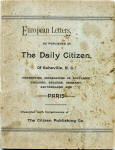 |
| 2 |
eur002
Title Page |
EUROPEAN LETTERS, by T.W. Patton, to The
Asheville Citizen. Description of the Tour of the North Carolina
Teachers, During the Summer of 1889. Asheville, N.C.: Citizen Publishing
Company. 1889. |
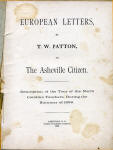 |
| 3 |
eur003 |
OUTWARD BOUND.
ON BOARD STEAMSHIP NEVADA,
July 8, 1889
dear citizen:—A
real nice company we
are, as to-day assembled on deck and
looking in all directions for a glimpse of
terra firma. Not a sign to be seen in any
direction to dispel the illusion with which
one
is apt often to flatter himself, that we
compose the whole world. Not a sail
dots the horizon. We may fancy that no
other humanity exists outside of this
ship, but that the heart of each voyageur
is
full of the dear ones, young and old, at home. Notwithstanding our
crowded
staterooms and unusual fare, we are all
determined like Mark Tapley to be jolly
under all circumstances. We will see how
this holds when the wind rises, causing
the
ship to roll and that terrible mal de
mer
to
appear. Anyone who can sustain
his
jollity under this trial will deserve a
crown indeed.
Our ship moves very smoothly forward
but
is not as comfortable as we were led
to
expect, and slow to a degree. Already
we
regret that we had not advised you
not to expect to hear of our landing before
the 20th. The staterooms are small
and
poorly furnished, and terribly
crowded. We, ourselves, are in one with
seven jolly companions. Eight men in a
compartment measuring 8x15 feet, and
to
live there for the next ten or twelve
days! The ladies are equal!}' crowded
and very uncomfortable, but they are
very brave, and do all in their power to
keep up the appearance of enjoyment.
Kind Mrs. Brodnax has already established
a class of infants in French, ourselves
included in the number, so that we
may hope to take care of our sous [sic] in
Paris.
Yes, we North Carolinians, enlightened
by
a few Carolinians, will survive the discomforts
of this voyage, for a merciful Providence has blessed us with the promise
of a fine spell of weather. The ocean
is
as calm as a lake; scarcely a perceptible swell. By a huge effort some
of the party have
gotten up an appearance of
seasickness, but your correspondent is not
equal to such a mental exertion, and
therefore continues as well as if on the
delightfully smooth streets of
Asheville.
We
were advised by a friend never to
say on board ship "waiter"
or "porter," but always "steward,"
and we have religiously done
so, but sad to say, no responsive
courtesy has followed this talisman.
If ever we catch one of these long-legged
dirty Scotch stewards at our home
we will take our revenge by inviting
him to take a walk over our
city's sidewalks.
This delightfully beautiful ocean, whose
tints of emerald tinged with golden sunshine,
we have never seen adequately portrayed
on canvas, but most nearly approximated by those sweet pictures of
Mr.
Church. How can our unskilled pen
attempt to describe the sensations of this,
our
first voyage! Oh, heavens! just as
we
are beginning to get up a poetic furor
there is the bell for lunch, and we must
sink our high-flown thoughts to the level
of
hard tack and century-old butter and
enter once more the arena in a struggle for life with our steward.
We will give you a few words more
when we have finished gulping down our
hard tack and our wrath.
BANKS OF
NEWFOUNDLAND.
July 11.—How few of us realize the size
of
our continent! Here we have been
sailing due east from New
York for four days and nights, and this wretched ship
is slow. We estimate that we have made successfully one-third of the
distance to Glasgow, and yet
here we are only south of Newfoundland, you might say still in
American waters, The temperature is
pleasantly mild, owing probably to the ...
|
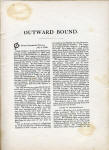 |
| 4 |
eur004 |
...
influence of the gulf stream, which is better
than the disagreeable cold of yesterday.
Our good party may be on deck find
we trust will be in better
health than yesterday. A sight
of these magnificent waves
and the drinking in of God's dear
sunshine and pure air will do them
good, and truly they get but little help from
man in their agony, for the woeful
mal de mer has appeared, and most woeful has been the
tyrant's onslaught. Standing as we
now do, taking a bird's-eye view of
the deck, we must Wonder "Is this
what one calls a pleasure
excursion ?" Probably fifty ladies, most of them teachers who
have been working hard and need all
the rest their short vacation can give, to enable them to resume their
arduous duties, many of them evidently
in bad health, and at this moment
undergoing worse sufferings than the most orthodox
pains of Gehenna. Our very heart bleeds for them as with pale,
distraught visage, each at intervals staggers to the taffrail in the
vain endeavor to vomit the tacks of
their shoes into the sea. At
times we cannot refrain a smile as the proverbial "Oh, my!" comes
up from one after another, but our
smiles indicate no lack of sympathy, for indeed we would do all
in our power to help them if we only
knew how to begin. One Sweet young girl faintly thanks us for
bathing her aching head, and sa37s:
"Oh, please just let me die,
and do nothing to help me. I
am so miserable. My poor mother! Why did I ever leave her for
this horrible voyage?" Yes, indeed,
why ? we wonder.
The cost on this ship is
certainly low. Thirty-five dollars
from New York to Glasgow is
not much, but the accommodations
are in proportion, and both
rooms and table fall far short of our expectations
from descriptions we have
heard of an ocean palace.
Our
people seem variously affected, generally
intense nausea and oft repeated
and terrible retchings,
but occasionally the symptoms are altogether different,
being' intense headache and icy
coldness, especially of hands
and feet. From this terrible
pain one young girl has just become
entirely delirious, frightening all
around her terribly. We, being
almost the only well man,
helped her to her berth, where one brave lady after another came
to
her help in the few moments intervening between their attacks of
devotion to
Neptune and his denizens.
Were it not for the
intrinsic merit of our good people,
especially the ladies, this sort of thing would be totally
unbearable. But they are so sweet, long suffering and endure their
troubles with so much fortitude and
patience—a lesson indeed to us
stern men which we may do well
to copy.
Kind Mrs. Brodnax forgets her sickness
in
efforts to amuse and interest all
around her. Her French
class is, with us, the feature of
the day. Please secure a French editor to translate our next letter,
because you no doubt perceive how
great difficulty we find in writing with our usual pure
Anglo-Saxon accent and nous avous peur que Le Citoyen ne comprenne
pa notre langage Francaise.
Of
those most deeply touching our sympathy
are Mrs. Kenan, of Wilmington, and Miss Hickey, of Danville, Va., both
of whom have suffered most dreadfully,
and still look fearfully. Much as we enjoy their company when well, we
do indeed wish they were in
their comfortable homes today.
Of the men we are the most
fortunate, having entirely escaped
seasickness, which we in part attribute to our well
known wisdom on which the E. J. pleasantly
remarked, but chiefly to the diet we have selected for our first
trans-Atlantic pleasure tour. French brandy and hard
tack has been our constant source of
consolation and support. Our young companion, Erwin Sluder, has been violently ill, and still suffers
very much, but has been himself like a real man and made
the best of his bad surroundings.
The
miseries of mal de mer no one can
even imagine save the sufferers. Not
being one of the
afflicted, we can only note the
personal appearance of our poor friends which, indeed, touches us
to the heart. We have never seen evidence of such intense nausea, and
the stomach being empty, the
retching is most painful. We fancy that a little pure, wholesome
food might cause relief, even if at
once rejected. We thought
once of giving you a pen picture of us as we are, but it would
be cruel. You must come and see for
yourself, if you wish to, but we are inclined to think that you
will consent to ...
|
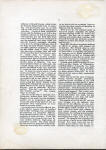 |
| 5 |
eur005 |
...
remain in ignorance, although for ourselves
we do not regret it. It has been an
experience for a lifetime, only we are glad we did not succeed in
urging some of our friends to come,
too.
There are some redeeming
traits, yes many of them. Everyone
is so considerate and anxious to help each other, and
so grateful for help when extended
to themselves. Then, too,
even the aesthetic is not altogether wanting. For instance,
it was lovely last night, as the
poor sufferers were sitting
on deck in the moonlight,
and Dr. Marshall says: "Young
folks, suppose we have prayers before we go to bed," and with
ready consent the puny, seasick
voices sweetly sing "Abide
With Me," and our parson, without book or gown, commends us all
to His care who can and will bring
us to "the haven where we would be," but will it be with
a grateful sense of His goodness, or
will we forget Him when health and happiness returns? Nous verrons.
IN AN OCEAN FOG.
July 13—We have often heard a fog
described, but only now have we experienced
one, and we have concluded that
it, like many of the
curiosities of ocean life, is not
worth experiencing. For orty-eight
hour it has surrounded us, as with a dark and misty pall; our
progress has at times been very slow,
the dismal fog horn blows every minute, at first it was
distressing in perverting sleep, but we have become so used to it
as to take it for a lullaby, and
find ourselves watching for its return. The decks are soaking
and slippery, but are preferred to the stuffy saloons and state rooms,
to which latter we only resort on command of the stewards at 11 o'clock,
and leave as early as a ray of light can pierce the
dingy glass of the loop hole. A
slight westerly wind pushes
the fog along with us and only
with a change of breeze can we
hope for relief.
The officers of this ship seem faithful
and
competent, the captain has kept his
post on the bridge unceasingly, and at
each bells through the
night the cry of the watchman assures
us "all is well."
The
purser is by all odds the most agreeable
gentlemen we have met since we left
New York. A Norwegian of extensive education,
most courteous in manner, and
doing his utmost to make us comfortable
; it is ever a real pleasure to know
such a man, and we do hope our
acquaintance may be
prolonged.
Even the pain and suffering of seasickness
must have an end, the sea is smooth
again, the ship rolls very little, our folks
all brighten up; last
night we took to the saloon and made it bright and lively with games and
chatting. Once more Dr. Marshall
reminds us to say "Our Father" and now we will see, as we suggested,
all are bright and happy. Will they
remember now ? Yes the young girls lay aside their cards, the backgammon
boards are closed, and almost a
hushed silence prevails, but we must
expect some young folks to
be thoughtless, A few beardless men must give proof of their
manhood, their amusement cannot be
suspected even for a moment; an insolent
steward accompanies the service
with a popping of corks, but no
matter, He will remember all
His children and that is the main part after all.
STILL IN THE FOG.
Sunday Morning, July 14.—If we knew
the name of this post-office, we would head this letter differently. The
fog is still with us and surrounds the ship causing
much discomfort on deck, and apparent
anxiety, as evidenced by extra care on the part of our captain, but
within
all is brighter and happier. How
wonderful it is that we can so soon adapt
ourselves to surrounding circumstances.
The ship, which on Sunday last we described
as beasth', is to-day a hayen of
rest, which we hope will enable us all to lift our hearts to that
Haven where we trust all, "the quick and the dead" will
be gathered together in God's good
time, in rest and felicity.
The
decks are as sloppy, the stewards
not quite as saucy, the state-rooms as
close, the food a little improved surety,
otherwise we cannot conceive how we
could enjoy it as we do. The porridge,
which one week ago, we rejected with the utmost contempt and scorn, is
now a real
attraction, strong enough to draw the
laziest from their downy couch at
seven o'clock.
Last evening we assembled in the saloon and enjoyed some sweet music
from
several young ladies. Miss Upchurch's |
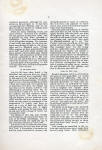 |
| 6 |
eur006 |
sweet voice brought forth sincere applause,
which she kindly recognized by
giving us an encore.
Also some beautiful recitations were rendered with spirit, and on behalf
of our
party and State, we tender our thanks to
Miss Wilson of West Virginia for her most excellent repetition of'Laska,
which being encored, gave us the pleasure of hearing well said The
Shadows.
Then Mr. Harrell who presided as secretary
of the Teachers Assembly, assisted by Prof. Smith.read some extracts
from an
exceedingly bright journal, the Newfoundland
Chantauquan of this day's issue, of
which the editorial staff was composed
of our young ladies, headed as we
guessed by Prof. Winston of
Chapel Hill, who
notwithstanding his seasickness still
painfully contriving, adds to the
pleasure of all who can read
him.
This most enterprising daily, might
take rank with the best of
newspapers, presenting its readers
with full press dispatches, taken en-route from the cable
which is "ten thousand Leagues under
the sea" on which we are
sailing, and such editorial
advice, as the citizen may do
well to copy, except that it would dread the criticism of its esteemed
contemporary the E. J. which
you know never approves of
good things.
The
staunch steamship Nevada, contributed
to the entertainment, ice cream
and
fruits which we much appreciated.
Well, we are dressed for church, that is
to say we have obeyed our
good wife's injunction to be sure to
shave each day. When
confessing our sins this morning
our conscience smote us with the
reflection that we had
forgotten her commands, so forthwith we attacked our rough
countenance with a rusty razor.
Oh, how we longed for the
manipulation of one of our
tonsnrial friends of Ashe-ville!
But bravely we proceeded with our task, and see what success has
attended our efforts. Why, the
bloody Wallace is put to shame
by our streaming gore, and we
are a worthy representative
of the Black Douglass, who we
learn to have been our progenitor.
Our throat is slashed from
ear to ear, And still the beard doth there appear.
But, however, we will not
leap further into poetry, but taking pity on you will
go back to philosophy, and say the
stern rough character of
the Scotch nation is no longer a matter of surprise to
us. This kind of porridge, and one
more such shave will make us
as fierce as Julius Caesar
himself. Moreover, a careful study of the Highlander's character
has revealed to us a talisman by which we have been able to reach the
heart and bring to light the hidden
courtesy of our steward. We will give our discovery to the world,
as it will not be patented.
We
were anxious to take some food to
a sick lady on deck, and
asked for a spoon. "Oh, no; against,
the ship's rules; lost, I will have to pay for it."
"Sir," we replied,
jingling a few sixpences in our pocket, "would a deposit
of fifty sovereigns be sufficient to
secure its return ? If not, let us say 100—it is
quite immaterial to us."
He
cries "Take it, by all means, my dear
sir. Is there aught else we can do for
you
or any of your friends ? If so, command
us, pray."
An revoir.
OFF THE IRISH COAST.
July 17.—The longest voyage must
have an end, and we are
now assured that to-morrow we will see land once more, and press our
mother earth with our delighted
soles.
Our
experience of a sea voyage has been
a
terrible disappointment to us. Its chief
distinctive features, have
been fog, and monotony. Had we been able to assemble in a comfortable saloon
and to have some music, etc., the
tedium would not have been
felt nearly so much. No one feels disposed to read much and the subjects
of conversation are exhausted, and even so distinguished a linguist as
your correspondent finds trouble in
making himself at all times
interesting.
The continuance of the fog for six days
and nights, we considered
at the time rather trying but now look back upon it
as a blessing in disguise, as it
entertained us with the dread
that our captain might miss
his reckoning while the sun was obscured, and we be several
thousands of miles out of our
course, but now his calculations
are verified and even this exciting
topic is lost. On the whole our conclusion is that Europe must
be very fine to pay for the
discomforts of this voyage, and we cannot think it a desirable
step |
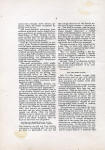 |
| 7 |
eur007 |
for our teachers, nor do
we think that one-tenth of the company would hesitate to give the full
cost of their trip if it could
only land them safely at home
to-day.
So much time has been consumed in
failure to start at
appointed time and in extreme
length of voyage, that their motions will be most hurried and
scarce a satisfactory glance can be had at those
things which they have traveled so
far to see and enjoy.
One of the curious
things to us is the difference in
time, as we sail eastward. At our rate of speed we estimate
that we gain about one minute in each hour. So that our watch which
still holds fast to New York time is something near four and a half
hours slow at this time. Not
remembering this we were startled this
morning when we went on deck as usual
at daybreak to find our watch marking
11.30"
p.m.
For the first time in several days we
are surrounded by a large number of
gulls (sea gulls we mean, having plenty
of ordinary gulls on board) which indicates
our approach to shore. The fog
has gone and the bright sun is delightful,
provided one can get protected from the
bleak wind. As cold almost as ours in
December. Good-bye, a few lines from
Glasgow to-morrow we hope. "Will wind
up this lengthy epistle. My right-hand
neighbor at the table
styles it: "The first epistle of Thomas to the Ashevillians."
 |
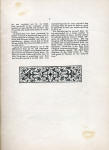 |